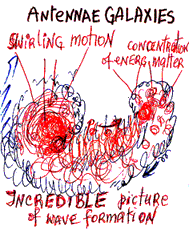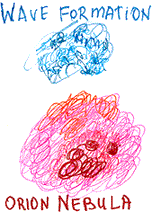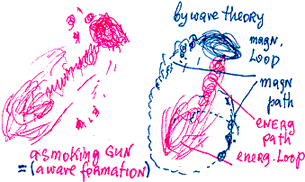Chapter
9
Wave Theory and the Universe
(Continued —
Page 2)
Printer-Friendly
Version
Wave formations in the universe can occur in different ways
as seen in the three pictures below:
 

Two other known forces are electromagnetic forces appearing
from the principal energetic force (in wave theory, electromagnetic
matter), and gravity, (in wave theory) a combination of forces
both internal (from within the object) and external (resulting
from contact with neighbouring waves).
In 1916, Einstein, in his theory of general relativity, suggested
that the universe must be either expanding or contracting
— it couldn’t just sit there. He was right on
both counts. The universe’s energetic transverse loop
will ultimately disperse (inflate) into space, while the magnetic
perpendicular loop will lose energy, contract as a supernova
and explode.
These two possibilities are very extreme. Simple energetic
matter creates simple, but ingenious wave formations. The
latter, in turn, create infinite complex connections. Energetic
matter creates a network of spiralling energetic and magnetic
paths, maintaining a tight hold on the universe’s energetic
matter. This rigid formation brakes the rapid decay of the
universe by loss of energy. In the very early universe, the
energetic force was very powerful and could have blown the
universe into space again; its swirling movement, however,
created a semi-closed formation, pushing energy back inside
and restricting its rapid expansion. Our universe is slowly
and continually losing energy. As to how it will end - this
can occur in many ways.
Nature’s wonderful creations defy our efforts to define
them. Natural behaviour does not conform to mathematically
rigid laws. Energetic matter has its rules of behaviour, but
within those rules it has a great deal of freedom. Many circumstances
affect wave behaviour; energetic matter continuously changes
its formations. We must combine natural (Darwin’s) and
mathematical (Einstein’s) ideas.
After the Big Bang, primordial vibrating swirling energetic
matter formed rotating and vibrating strings, quarks and swirls
that coalesced into our universe. The universe is comprised
of clumps and clusters of energetic matter, as well as microwaves
that filled the early universe. With the appearance of an
energetic swirl (loop, universe), there appeared a magnetic
counterpart that together formed a defined stable space.
In 1921, the mathematician Kaluza posited that if we could
formulate a fifth dimension, we might discover the shape of
the universe. In 1926, Kaluza and the physicist Klein proposed
that the fifth dimension is round and not large. In 1927,
Lemaître presented his Big Bang theory. In 1979, Alan
Guth developed the theory of inflation. These concepts are
in line with wave theory, which, like all natural theories
(for example, Darwin’s), pulls together many observations
and experiments. Kaluza and Klein’s fifth dimension
matches the properties of a magnetic loop. Guth’s inflation
is the primary force and behaviour of energetic matter.
Everything in the universe undergoes phases of creation,
duration and decay, which vary according to the surroundings.
Space, energy and time do not completely disappear; they shift
to other life cycles. In the vast universe, energetic activity
always occurs with new creations and old “genes.”
With its different energetic levels, space and time are infinite
and changeable. When new energetic swirls, time and space
appear, “genes” from previous cycles are transmitted
to these new creations.
Back to
Top
Dr. Chaim Tejman, Copyright©
2001. All rights reserved.
[Index]
[Introduction]
[Summary] [Wave
Formation] [Photons] [Gravitation]
[Time]
[Atoms] [Life]
[Cancer] [Fundamental
Force] [Gender/Why Sex?]
[Sexual Reproduction]
[Schrodinger & Heisenberg]
[Creation] [Supernova]
[Dark
Matter & Astronomy] [Speed
of Light] [Cloud Formations]
[Natural Disasters] [Global
Warming] [Thermodynamics]
[Backward Time] [Quantum
Mechanics] [Compton Effect]
[Equations] [Predictions]
[Academic Correspondences] [Contact]
[Links] [Mysteries] |